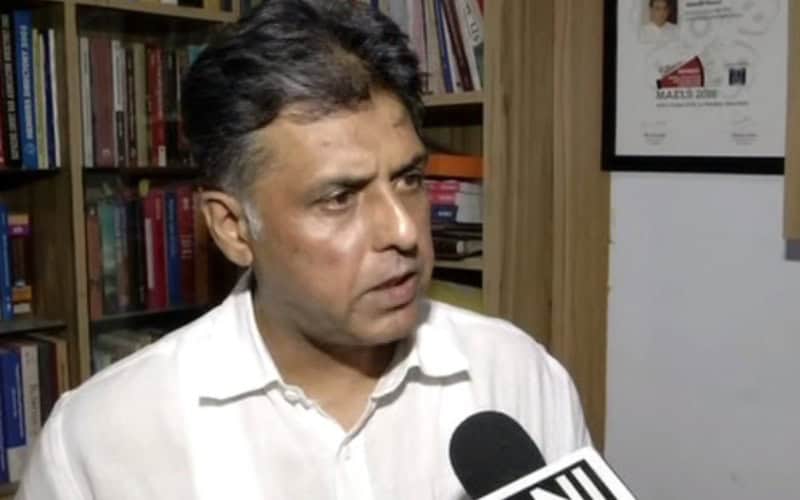New Delhi: The Congress on Tuesday said that Centre’s affidavit to the Supreme Court on the controversial Rafale deal was more concealing than revealing and sought clarification from the government on five contentious points about the fighter plane deal, which the government was justifying.
Addressing a press conference here, Congress leader and former Union Minister Manish Tiwari said, “The affidavit actually conceals more than it reveals. We would like to ask the NDA government five fundamental questions, which underscore the fact that the government is trying to conceal more than it reveals.”
Tiwari stated that paragraphs 18 and 21 of the government’s affidavit confirms that the UPA government’s Medium Multi-Role Combat Aircraft (MMRCA) deal and the NDA’s Rafale deal were two separate defense procurement agreements.
“Then how is it that on April 10, 2015, when the Prime Minister went to France, did the government arrive at the conclusion that India will purchase 36 aircraft, when the formal decision to terminate the MMRCA process was taken in June 2015,” Tiwari asked.
The Congress leader then asked if the Indian Air Force (IAF) were on board to roll back the procurement from 126 to 36 aircraft. “The question is, was the air force on board with this decision. If this was the case, when was the SQRs (Service Qualitative Requirements) initiated? If the MMRCA had collapsed, the SQRs, which is the initiation of any such process, when were they done?” Tiwari asked.
He further asked when was the Statement of Case, which is issued by the (Army, Air Force or Navy), made. “Not only that it goes through something called the Service Capital Acquisition Plan Categorisation Committee (SCAPCC) and the SCAPC Higher Committee before it is submitted to the Defence Acquisition Council (DAC) for the acceptance of necessity. So, when were these meetings held?” Tiwari enquired.
“These four fundamental steps constitute a clear violation of the defense procurement procedure,” Tiwari added.
The Congress’ third question was how could the government pre-decide that they needed 36 Rafale jets, the announcement for which was made on April 10, 2015, before the DAC accorded the acceptance of necessity on May 13, 2015.
“Our direct charge is that this is a command performance. Rather than a process dovetailing into a decision, a decision has been made and the process is structured in order to provide justification or legitimacy to that decision,” Tiwari said.
The Bharatiya Janata Party (BJP)-led National Democratic Alliance (NDA) government had on Monday submitted details of the decision-making process about the Rafale deal to the apex court, in accordance with the court’s October 31 direction.
A version of the document, which was made available to the petitioners, said that all requisite steps as per the requirement of the Defence Procurement Procedure, 2013, were followed while procuring the fighter planes.
The document further added that the delay caused by the United Progressive Alliance (UPA) government in finalizing the Medium Multi-Role Combat Aircraft deal had allowed India’s adversaries to ramp up defense procurement and expand their existing fleets of fighter planes with more advanced jets.
Tiwari further said that the BJP’s justification for the hike in the per-aircraft price of the jets from Rs 500 crore to Rs 1,600 crore, which the former said was down to making India-specific enhancements and arming the jets, was contradicted in the affidavit submitted to the Supreme Court.
The Congress leader highlighted paragraph 23 of the affidavit, which says that the “operational capability of 36 Rafale aircraft will be in accordance with the SQRs for the procurement of the MMRCA.”
Tiwari added, “If the 36 aircraft that you bought is exactly similar to the 18 which the MMRCA tender process envisaged, how did the price go up by Rs 1,100 crore per aircraft?”
The Congress’ fourth query was–why the Hindustan Aeronautics Limited (HAL) was cut out of the process at the last moment, adding that if there were a mismatch between the number of hours of labour work needed in India against that in France, they should have also accounted for the considerable difference in the labour costs in the two countries.
The final question the Congress sought an answer for was why the defense procurement procedure of 2013 was retrospectively amended on August 05, 2015, adding that it was done to “absolve the Ministry of Defence of pre-vetting India offset partners.”
“Because it was very difficult to justify that the partner or the preferred partner, which according to President Hollande was a condition precedent for this transaction to go through, you amended the defense procurement procedure because you knew you will not be able to justify it,” Tiwari said.
[source_without_link]ANI[/source_without_link]

